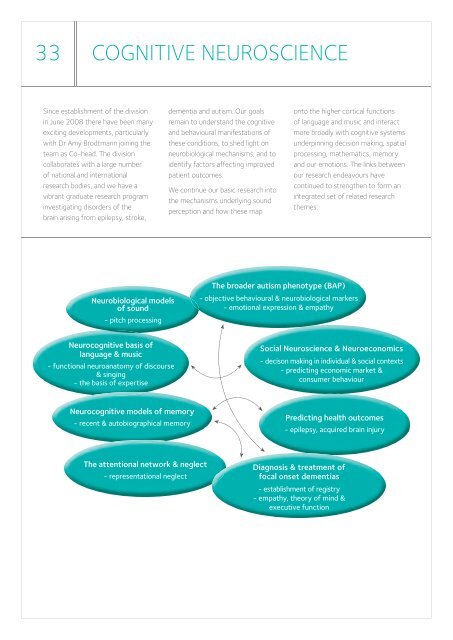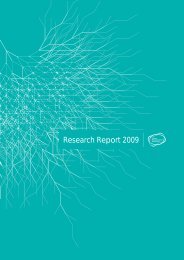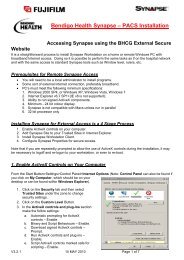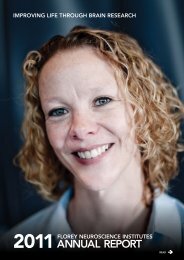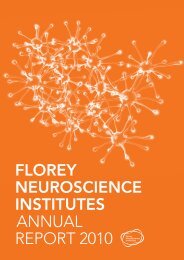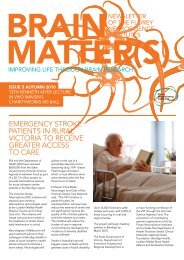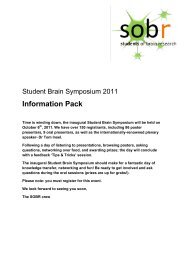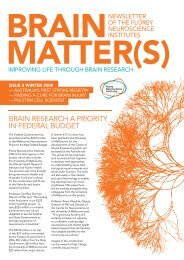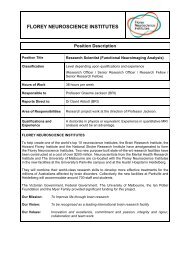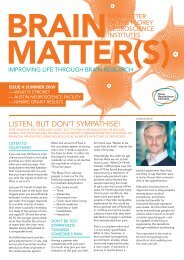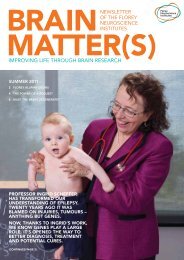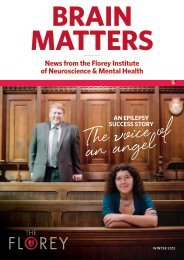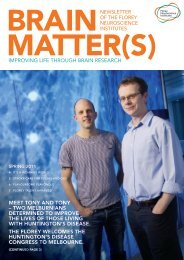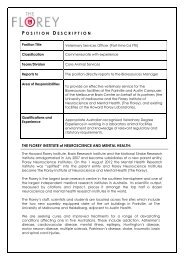Annual Report 2009 - Florey Neuroscience Institutes
Annual Report 2009 - Florey Neuroscience Institutes
Annual Report 2009 - Florey Neuroscience Institutes
You also want an ePaper? Increase the reach of your titles
YUMPU automatically turns print PDFs into web optimized ePapers that Google loves.
33 COGNITIVE NEUROSCIENCE<br />
Since establishment of the division<br />
in June 2008 there have been many<br />
exciting developments, particularly<br />
with Dr Amy Brodtmann joining the<br />
team as Co-head. The division<br />
collaborates with a large number<br />
of national and international<br />
research bodies, and we have a<br />
vibrant graduate research program<br />
investigating disorders of the<br />
brain arising from epilepsy, stroke,<br />
Neurobiological models<br />
of sound<br />
- pitch processing<br />
Neurocognitive basis of<br />
language & music<br />
- functional neuroanatomy of discourse<br />
& singing<br />
- the basis of expertise<br />
Neurocognitive models of memory<br />
- recent & autobiographical memory<br />
The attentional network & neglect<br />
- representational neglect<br />
dementia and autism. Our goals<br />
remain to understand the cognitive<br />
and behavioural manifestations of<br />
these conditions, to shed light on<br />
neurobiological mechanisms, and to<br />
identify factors affecting improved<br />
patient outcomes.<br />
We continue our basic research into<br />
the mechanisms underlying sound<br />
perception and how these map<br />
The broader autism phenotype (BAP)<br />
onto the higher cortical functions<br />
of language and music and interact<br />
more broadly with cognitive systems<br />
underpinning decision making, spatial<br />
processing, mathematics, memory<br />
and our emotions. The links between<br />
our research endeavours have<br />
continued to strengthen to form an<br />
integrated set of related research<br />
themes:<br />
- objective behavioural & neurobiological markers<br />
- emotional expression & empathy<br />
Social <strong>Neuroscience</strong> & Neuroeconomics<br />
- decison making in individual & social contexts<br />
- predicting economic market &<br />
consumer behaviour<br />
Predicting health outcomes<br />
- epilepsy, acquired brain injury<br />
Diagnosis & treatment of<br />
focal onset dementias<br />
- establishment of registry<br />
- empathy, theory of mind &<br />
executive function<br />
RESEARCH HIGHLIGHTS<br />
In expanding our profi le, the division<br />
has supported the development<br />
of a new Social <strong>Neuroscience</strong> and<br />
Neuroeconomic (SNN) research hub<br />
to examine leading-edge research<br />
issues in social, affective and<br />
cognitive neuroscience informed by<br />
the theory and practice of economics<br />
and commerce. This research hub<br />
brings inter-disciplinary research<br />
expertise to extend FNI’s presence<br />
in the burgeoning fi elds of applied<br />
neuroscience.<br />
Other highlights include the award<br />
of substantial funding from the<br />
National Health & Medical Research<br />
Council (NHMRC) for our research<br />
investigating the genetic basis of<br />
autism spectrum disorders. Recently,<br />
we have also received funding from<br />
the Academy of the Social Sciences<br />
in Australia (ASSA) to support a<br />
signifi cant new international research<br />
collaboration investigating the use of<br />
music to facilitate language recovery<br />
after stroke. In addition to providing<br />
insights into the optimisation of<br />
language rehabilitation strategies,<br />
this project will directly contribute to<br />
our knowledge of the organisation<br />
of higher cortical functions and their<br />
interactions. Part of this research is<br />
being undertaken at the International<br />
Laboratory of Brain, Music and<br />
Sound Research (BRAMS), which<br />
is a multi-university consortium<br />
jointly affi liated to McGill University<br />
and the University of Montréal,<br />
Canada. It houses state-of-the-art<br />
facilities dedicated to the study of<br />
brain organisation and the cognitive<br />
processes supporting music<br />
behaviour, and provides new and<br />
exciting graduate and postdoctoral<br />
exchange opportunities between<br />
Australia and Canada for junior<br />
researchers at FNI.<br />
34


